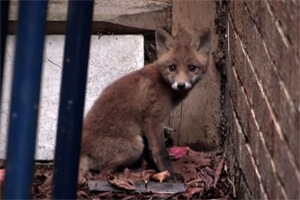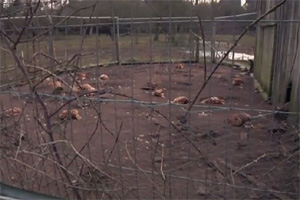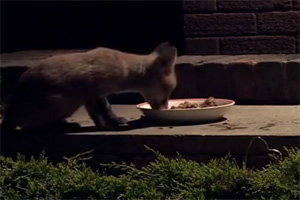Watch BBC Fox Wars Documentary (2013)
When ‘Fox Wars’ was first advertised on the BBC, I wasn’t sure exactly what to expect and I was slightly concerned that the documentary was going to concentrate only on the negative aspects of foxes.
However, upon watching it, I was pleased to find that it was a very balanced programme, looking at both fox lovers and fox dislikers, as well as showing the complexities that occur in the world of fox control.
Importantly, it also looked at foxes in urban areas and the countryside and resisted the temptation of looking only at London’s urban foxes, though of course, the topic of foxes in London was covered.
Narrated by the always-excellent Rebecca Front, the show introduced us to some interesting characters.
The characters for and against urban foxes
On the pro-fox side, we had the quite anti-social Nobby from Barnet, who enjoyed feeding foxes in his junk-filled back garden, much to the annoyance of some of his neighbours.
In amongst his old oil drums, barbeques, plastic containers and bricks, Nobby feeds a combination of cat and dog food to the fox, with the fox responding eagerly to his calls.
If Nobby was a fox lover who came across as a bit of an oddball in a street that was very anti-fox, we were also introduced to the more likeable Kate, who lives in a cul-de-sac in Nottingham in which her and her neighbours are all very keen fox watchers.
They regularly put out food and watch from behind a curtain, enjoying watching and learning from the foxes’ behaviour.

One of the anti-fox brigade is the outspoken Janet, from Newport in South Wales:
“If I can hit it unconscious, then I will, then put it in a dustbin and and drive it down to the nearest tip!”
She’d had enough of foxes pooing in her garden. The smell and discolouration of her lawn had caused her to buy several fox deterrent products (details below).
The camera crew set up a camera in her garden and it’s worth watching just to see her reaction when she’s shown the footage!
Again, to balance out loud Janet, just down the road from Nobby is Sophia, a mild mannered fox disliker, who just wants to protect her bantam hens rather than cause any harm to the fox.
She also lists a variety of fox repellents she’s tried, though reveals her brother and father drew the line at urinating around the garden as a means of deterring the fox.
While fun and interesting to watch, these people aren’t really surprising – urban dwellers, who either like or dislike foxes.
Not all fox controllers work in the same way
However, what this documentary reveals, and something that is very under-discussed, is that there are differing opinions between fox controllers who are brought in to deal with the fox situation.

On the one hand, we have Tim, who is an experienced fox controller with a gun licence and specialises in shooting foxes in urban areas with his silenced rifle.
While Tim is an animal lover, he also has no problem with humanely shooting foxes if it helps to solve the problems of people who have asked him to sort it out.
On the other hand, we see Terry and Graham from Fox-a-gon, who specialise in “evicting and moving foxes on” rather than destroying them.
They would rather move a fox on from the place where it’s causing a nuisance, instead of killing it only for another fox to come and take it’s place within a week to ten days.
We also see Terry volunteering for The Fox Project, a charity that looks after sick or injured foxes and has released almost 10,000 foxes back into the wild.
Terry also makes one of the most profound statements of the documentary:
“All this that we see around us, this beautiful landscape, with it’s vast variety of flora and fauna, all runs in balance and harmony. If you start taking out what you don’t like – the squirrels, the badgers, the foxes – then you end up with nothing.”

Countryside foxes
We also get a perspective on foxes in the countryside from Tony in Oxfordshire, a farmer who has lost a massive 36 chickens to a fox in one session (we get to see the devastating crime scene), and David, a sheep farmer from the South East, who has a couple of his lambs destroyed by a fox.
Their frustration at losing animals (and therefore money) to a fox is very understandable.
The point is also made that in the vast open ares of the country, bringing in fox controllers to shoot foxes is their only option, as they can’t employ the same fox repellent methods that you can in enclosed urban gardens.
Lee, a fox controller who has shot around 2,300 foxes in ten years, is brought in to deal with the lamb-killing fox on David’s farm.
He makes the interesting point that many people who like foxes just see the cute and cuddly red fur, but they don’t see the damage that a fox can do to the business of a sheep or chicken farmer.
This is a valid opinion and it’s the presentation of views like this that makes the documentary so interesting.
Final thoughts on the Fox Wars Documentary
In conclusion, Fox Wars is a very well-made and though-provoking documentary about foxes and how they impact our lives.
It steers well clear of tabloid-style sensationalism, presenting a balanced view and allowing the viewer to make their own mind up about their feelings for foxes.
Some interesting facts the documentary told us were:
- In London, there are 16 foxes for every square mile.
- There are 7 times as many foxes in the countryside than in urban areas.
- If you catch a fox in a cage, putting a blanket over the cage will quickly pacify and calm down a fox
- It can cost up to £200 per fox killed, although the hunter may have to spend many hours stalking the fox through the night.
- Anyone brought in to humanely shoot a fox MUST have a valid gun licence.
Fox Repellent Products shown in the documentary are:
4m22s – Brown Fence Wall Spikes
8m10s – Foxolutions Scoot Fox Repellent





